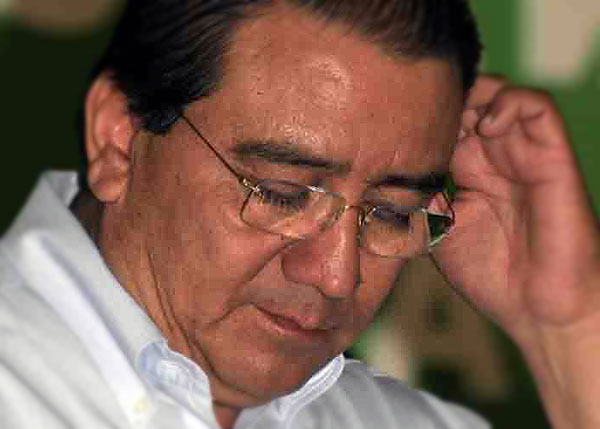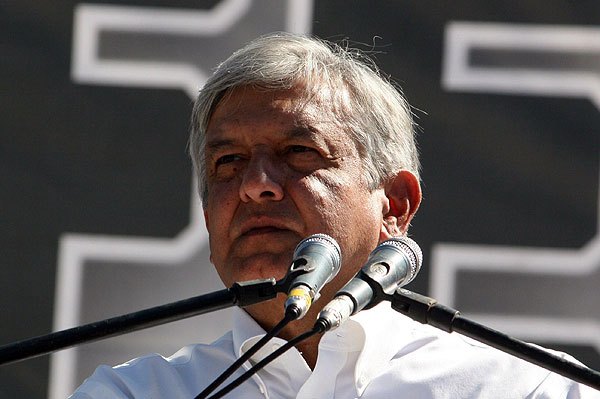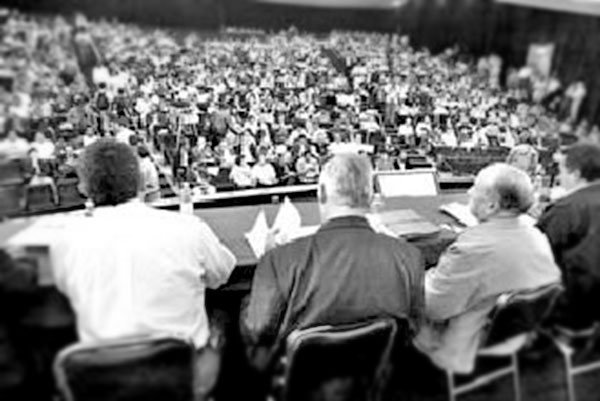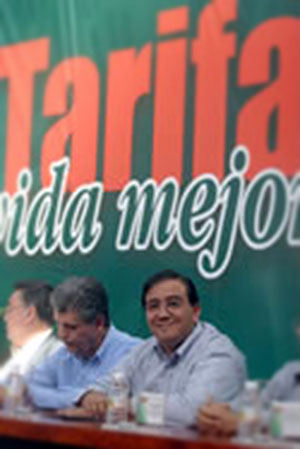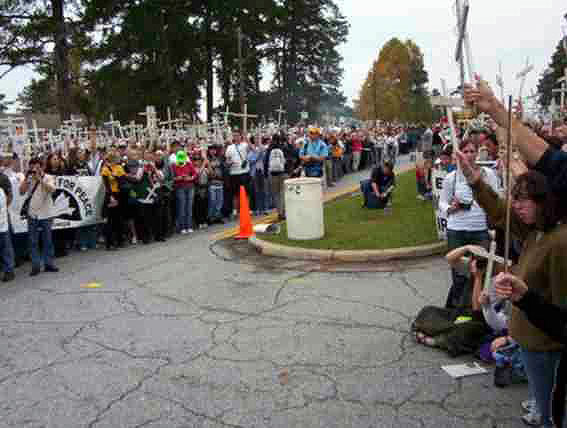SIPAZ Activities (July – September, 2004)
30/09/20042004
31/12/2004On October 3rd elections were held in Chiapas in order to select 118 municipal presidents and 40 local representatives for the State Congress.
The Zapatista Juntas de Buen Gobierno (Councils of Good Government) fulfilled its promise to respect the work of the electoral bodies. The council announced this in August, requesting that “in the same way that we respect those who want to vote, you must respect those who do not.” This decision confirmed the non-confrontation option of the Zapatista movement.
Over the past ten years, violent incidents such as robbery, burning of voting boxes, and confrontations between antagonistic groups have been documented in every local and state election. This time the elections were carried out in relative calm, although twelve complaints were later received regarding the possible perpetrating of electoral crimes. Additionally, “client practices” (distribution of supplies and money) and transporting of voters to the election booths continued to be reported.
Voter turnout on October 3rd was high when compared with previous years, with only 45 percent of voters abstaining even though the number of ballots found to be void was over 73,000 (representing more than 5% of those who voted).
Another striking and even paradoxical element is that the majority of political actors consider themselves to have “won” in these elections. Although the PRI, Partido Revolucionario Institucional (Institutional Revolutionary Party), lost the absolute majority in the local Congress for the first time, it continues to be the principal political force in the state, with 18 out of 40 representative seats. At the municipal level, the PRI took various important cities, such as the capital Tuxtla Gutierrez and San Cristóbal de Las Casas, from the PAN, Partido de Acción Nacional (National Action Party). The PRI lost 19 municipalities. They now control 53 of Chiapas’ municipalities, whereas they had previously governed 72.
La Alianza por Chiapas (the Alliance for Chiapas), formed by the PRD, Partido de la Revolución Democrática (Democratic Revolutionary Party), the PAN and the PT, Partido del Trabajo (Worker’s Party), ended with almost half of the legislative seats and 27 of the municipalities in Chiapas.
The PVEM, Partido Verde Ecologista de México (Ecological Green Party of Mexico), obtained more than 14 percent of the votes, which places the party very close to the PAN and the PRD. The PVEM will continue governing in 4 municipalities and will be participating in 4 more municipal governments through their alliance with the PRI.
The current governor of the state, Pablo Salazar Mendiguchía, suffered a relative setback as the people close to him were defeated in the elections in San Cristóbal de las Casas. Nevertheless, the election also resulted in the PRI’s loss of absolute majority in the Congress. This could allow the governor to strengthen his government projects in the last two years remaining of his administration.
Election of Representatives
| N° OF VOTES |
PERCENTAGE | |
| PRD-PAN-PT | 517.175 | 38.78 |
| PRI-PVEM | 139.638 | 10.47 |
| PRI | 428.718 | 32.15 |
| PVEM | 124.566 | 9.34 |
| Convergencia | 48.829 | 3.66 |
| Nulos | 73.363 | 5.50 |
| No Registrados |
1.295 | 0.10 |
Municipal Elections
| N° OF MUNICIPALITIES |
|
| PRI | 53 |
| PAN | 11 |
| PRD | 14 |
| PVEM | 4 |
| PT | 3 |
| Alianza por Chiapas | 27 |
| Alianza para Todos | 4 |
| Convergencia | 2 |
| TOTAL | 118 |
State Electoral Panorama In View Of 2006
The October elections served as a political barometer for the elections of 2006, when the successor to Pablo Salazar Mendiguchía, the current governor of Chiapas, will be elected.
The representatives of the parties which formed the Alianza por Chiapas (PAN, PRD and PT) affirmed in public declarations that only by forming alliances can they succeed in defeating the PRI in 2006. Also, they recognized the polemic character of the coalitions between parties who are “incompatible” at the federal level, as it implies alliances of the left with the right. The PAN does not have much presence in rural zones. The PRD finds itself divided by internal struggles. It remains to be seen how this alliance can be sustained.
In this vein, it is worthwhile to underline the blurring and weakening of the parties (in a smaller measure in the case of the PRI). On September 27, some eight thousand faithful of the San Cristóbal diocese (which includes 46 municipalities in Chiapas) undertook a march in order to demand the liberation of various prisoners from among their parishes (see the previous report). Referring to the electoral process in their public statement, they diagnosed the problem as follows: “politics, under the big economic interests, seems to have lost its way and only expresses itself in a sick struggle and search for power for power’s sake, forgetting to respond to the needs and the demands of the general population.”
Yet another fact implies a change in 2006: at the end of October a legal initiative was passed, proposing modifications to article 35 of the Political Constitution of the State regarding the requirements for being elected to the state governor’s office. This could leave out various “pretenders” such as Roberto Albores of the PRI and Emilio Zebadúa of the PRD.
These modifications include, for example, that in order to contend as a candidate for governor one cannot have previously occupied the office of constitutional, provisional, interim or substitute governor and cannot be subject to criminal proceedings. Also they establish that the candidate must be a Chiapas native and have been a resident of the state for a minimum of five years.
The proposal also foresaw other modifications to the secondary laws in electoral matters. It proposes that spouses or family members of governors or mayors not be allowed to participate in electoral races. The proposal poses the reduction of the campaign period to two months and the creation of an autonomous and independent commission to monitor elections; however, this commission would be appointed by the state Congress by suggestion of the local Executive.
This act invoked diverse opposing reactions, particularly within the state PRI party, who in the voice of the coordinator of the parliamentary faction of this party, Mario Carlos Culebro, described the measure as “antidemocratic, authoritarian, overwhelming, totalitarian, archaic and against the will of the people of Chiapas.”
The Increasing Delegitimization Of Partisan Democracy
What is happening in Chiapas reflects the situation at a national level, as 2006 is also a federal election year. The principal political parties are experiencing a severe crisis of political credibility following recent financial scandals from which none escaped unharmed. In addition, the power games directed at impeding the possible candidacy of the current chief of the Federal District Government, Andrés Manuel López Obrador, by stripping him of official immunity, have come under scrutiny.
In mid-November, another event exacerbated the existing rupture between the executive and legislative power when President Fox announced that he would legally challenge the Budget for Expenditures of the Federation for 2005, approved by the House of Representatives. He described the budget as “incongruent and unviable.” He affirmed that the representatives from the opposition want to block the federal government and impede the fulfillment of its objective of improving the lives of Mexicans. Senators from the PRI and the PRD demanded that President Fox stop engaging in confrontations with the Congress and accept the Budget of Expenditures approved by the House of Representatives or he will lead the country into a state of ungovernability.
In November another event occurred which was interpreted as a demonstration of the weakening and discrediting of the institutions and the growing lack of confidence of the population towards these bodies: the lynching of two police officers in Tláhuac in the Federal District. Analysts also pointed to the responsibility of the media, in particular television, in encouraging a “climate of terror” in order to justify the repression and violence. According to the Director of Amnesty International, México Bureau, these expressions of violence are on the rise, especially in those countries where there exists an inability to guarantee the rule of law.
The Search For Alternatives
In this context, on the 27th and 28th of November, the First National Dialogue for a National Project of Liberty, Justice and Democracy was convened in México City. This provocative initiative, above all, but not exclusively, due to the coming together of the unions, proposed to convene “all of the social, cultural and political sectors so that we can advance together in the elaboration of a diagnosis of large national and international problems, outlining all of the essential aspects of an Alternative National Project and uniting all of those in resistance to savage capitalism and the corporate system in order to build a proposal capable of disputing the driving of the nation into neo-liberal cruelty.”
More than 1700 participants from 164 social, labor and campesino (peasants who work the land), indigenous, student, union and political organizations attended the event and they agreed “to reject the model of destruction and death called Neo-liberalism” and “to continue this process of dialogue in the entire country, with the purpose of strengthening the resistance movements and at the same time nourishing the process of formulating a National Project of Liberty, Justice and Democracy.” It’s fitting to emphasize that various reports made reference to Zapatista caracoles as a positive example of new ways of participation that should be encouraged beyond anti-establishment actions.
In the beginning of December, the forum “Against silence and oblivion: the voice of the indigenous peoples of México” took place in Chilpancingo, Guerrero. The participating organizations reaffirmed their determination to continue the struggle against the “indigenous counter reform of 2001” (a law dealing with indigenous rights and culture approved in 2001 that was disowned by the EZLN and the principal indigenous organizations in the country) and to exercise the right to “be government” through action.
… … … … … …
Notes on Montes Azules
In October, the special representative for the case of the Secretary of Agricultural Reform (SRA), Martha Cecilia Díaz Gordillo, announced that 25 “irregular” communities in the Lacandona Community and Integral Reserve of the Montes Azules Biosphere have signed agreements to resolve the agricultural-environmental problem and that it is negotiating with 18 others the possibility of accepting relocation and normalization via expropriation (El Universal, 12 de octubre de 2004).
On the other side, at the end of October, the EZLN announced its intention of relocating several of its communities situated in the south of the Montes Azules biosphere, requesting support from national and international civil society to help with the move and the regrouping.
The EZLN (Zapatista National Liberation Army) explained this decision, affirming that “with the advance of what has been called the ‘councils of good government,’ a large number of indigenous Zapatista communities have been provided with the means to substantially improve their living conditions. However, the distance and dispersed locations of a number of these communities have represented significant difficulties, by which the EZLN has concluded, with the express consent of the inhabitants, to relocate some of the Zapatista communities in this zone, in order for them to be covered by the jurisdiction of the Council of Good Government in the jungle border region”.
The communities that have relocated and will be relocated (while not the only Zapatista communities in this zone) include Primero de Enero, San Isidro, 12 de Diciembre, 8 de Octubre, Santa Cruz, Nuevo Limar, and Agua Dulce. This relocation, which implies a strategic repositioning on behalf of the EZLN, has been considered by some as a withdrawal and by others as the only way in which to better defend and support their communities in the southern part of the reserve. It has taken place without violence or publicity.
In November, 29 Tzotzil families from the San Isidro settlement (a non-Zapatista portion of the population) and Sol Paraíso were relocated to the new community of Nueva Magdalena, outside of the protected forest zone. This same month, representatives of 20 de Noviembre and Nuevo México, two communities of more than 40 people that had been identified for eviction or relocation, broke off negotiations with the federal and state governments. They stated: “We believe that we are the new object of lies, that they want to use us, and we therefore request that the Secretary of Agrarian Reform, Florencio Salazar Adame, and the governor, Pablo Salazar, permanently leave us in this place without disrupting our social peace.”
At the end of November, a variety of social organizations from the municipality of Ocosingo with a presence in Montes Azules warned that “if the government wishes to maintain a dialogue, it should do so with respect and from the ground up, persons without decision-making capacity will not be accepted.” They also requested an immediate cessation to the harassment that the CISEN (Center of Investigation and National Security) has directed against them.
… … … … … …
Ongoing Concerns On The Subject Of Human Rights
In October, various civil organizations expressed their indignation over the confirmation of José Luis Soberanes as President of the National Commission of Human Rights (CNDH) for the 2004-2009 term. They deplored “the manner in which the selection process was conducted: with a partisan agreement at the final hour, an extremely limited and reduced participation as to the number of civil society organizations and the time given to them to present their opinions and proposals, a closed door (…) with no explanation of the criteria on which it was based in order to almost automatically confirm Dr. Soberanes.” They affirmed that “the Senator is not contributing to the strengthening of an autonomous body, but rather the opposite. What he is really doing is putting its legitimacy at risk, a legitimacy that has already been called into question, thereby weakening the entire National System of Human Rights Protection in the country.”
In November, the Chiapas Network of Human Rights pronounced itself in opposition to the Law for the Promotion and Protection of Human Rights passed by the state this month, considering that it would generate a setback in the autonomy and efficacy of the Chiapas State Commission of Human Rights (CEDH). They also questioned the recent designation of Yesmín Lima Adam as the head of the institution, charging that he was nominated “without an adequate framework and without a process that was transparent and inclusive of society.” They underlined: “These acts of the State Congress, adding to the arbitrary destitution of Pedro Raúl López in recent months, and to the vigorous State Criminal Code reforms of last May, dramatically harm the integrity of human rights in the state of Chiapas, limiting the enjoyment of fundamental guarantees and weakening the body dedicated to their protection.” (see Frayba Website)
In December, Amnesty International published a report “Silent abuses in Guadalajara: the refusal to shed light on human rights violations only perpetuates impunity” that states: “The Mexican government has expressed on repeated occasions its promise to prevent and sanction human rights violations in the state of Mexico. However, violations, such as the arbitrary detention, torture and beatings which occurred in Guadalajara during the Third Summit of Latin America, the Caribbean and the European Union in May 2004 underline that serious abuses of this nature, particularly on the state and municipal level, continue to be common in this country.” In respect to this case, although CNDH has documented 118 detentions and 19 cases of torture, the recommendations contained in this report have been rejected by the governor of Guadalajara.
… … … … … …

